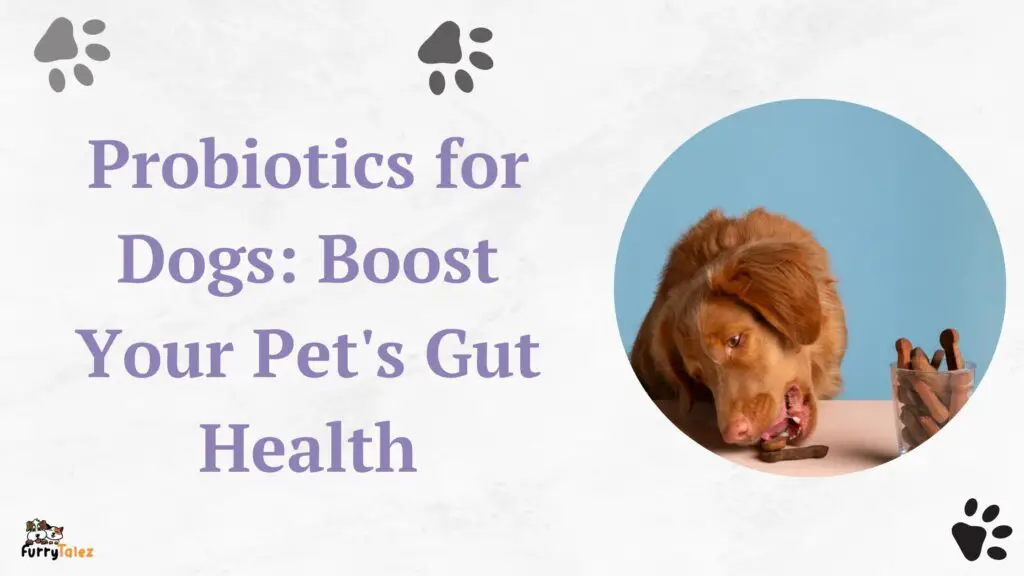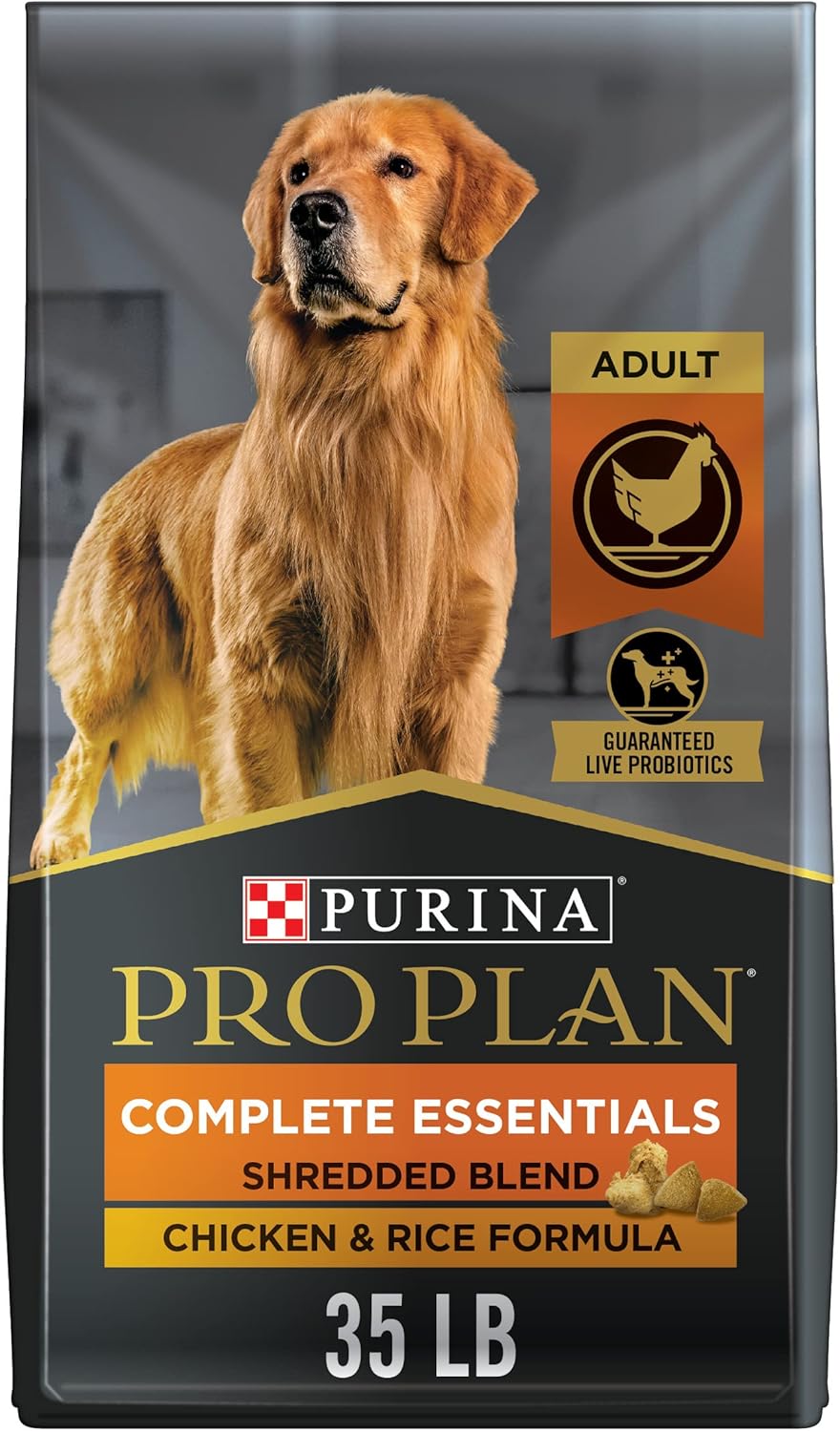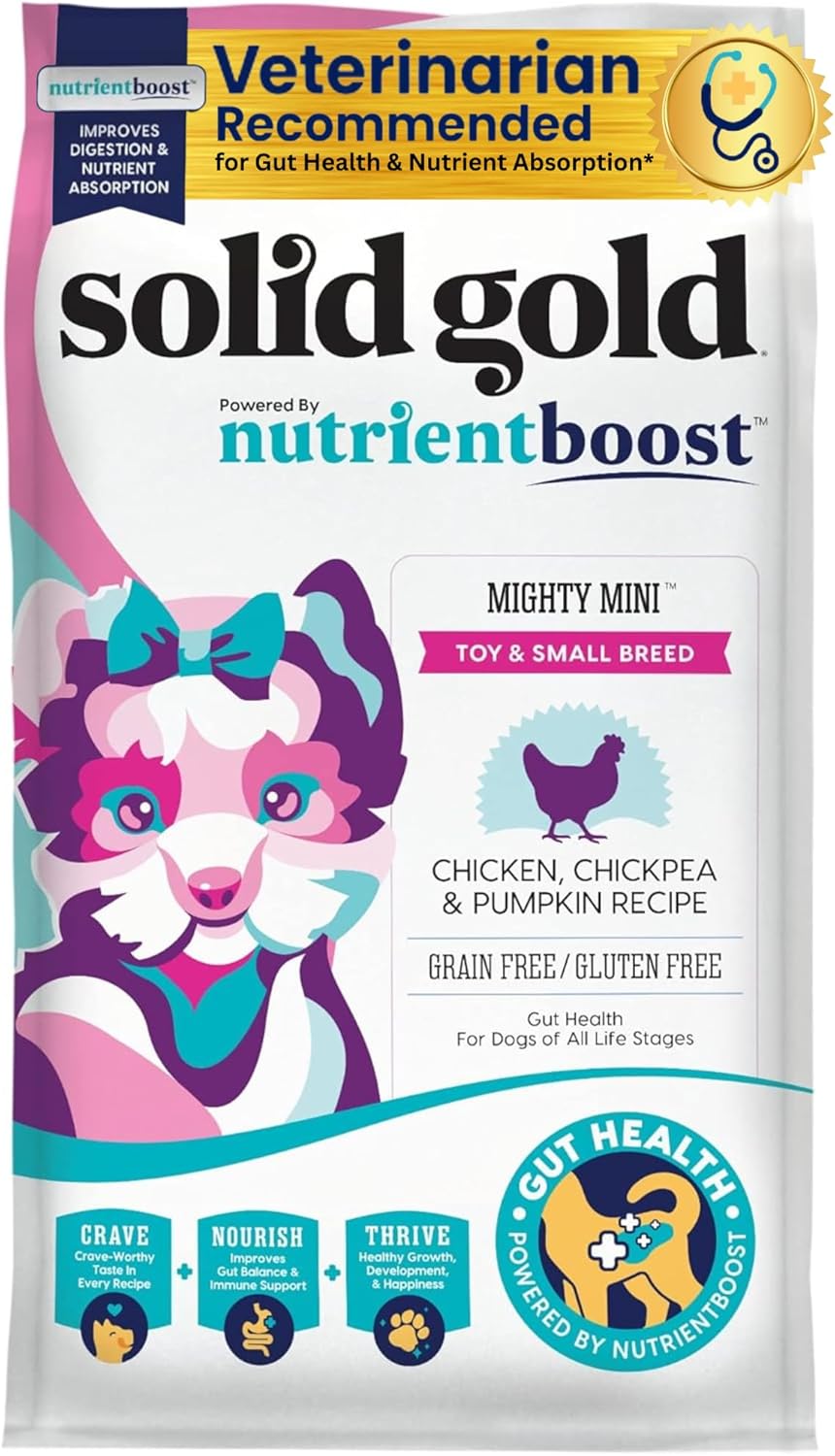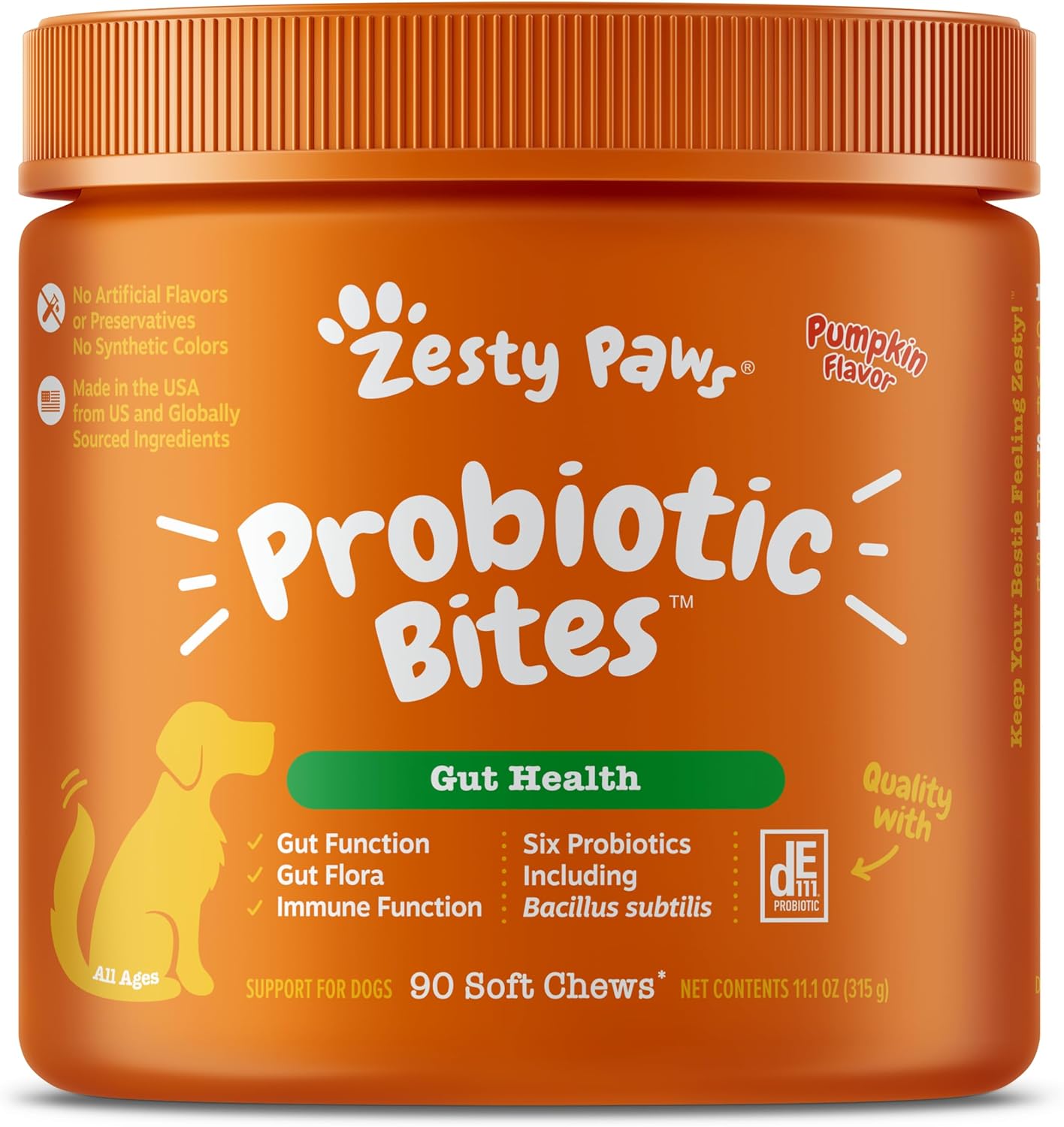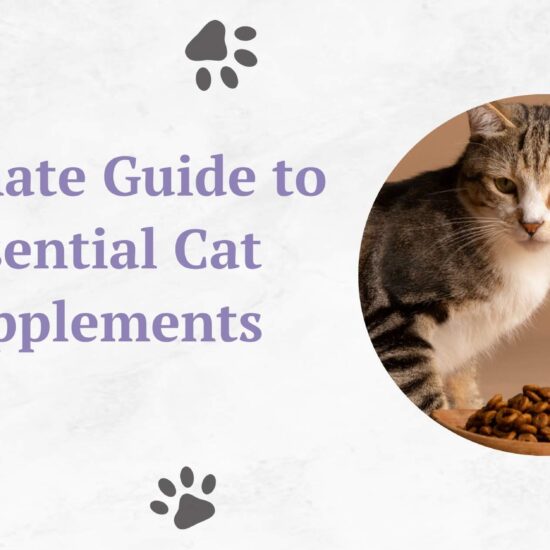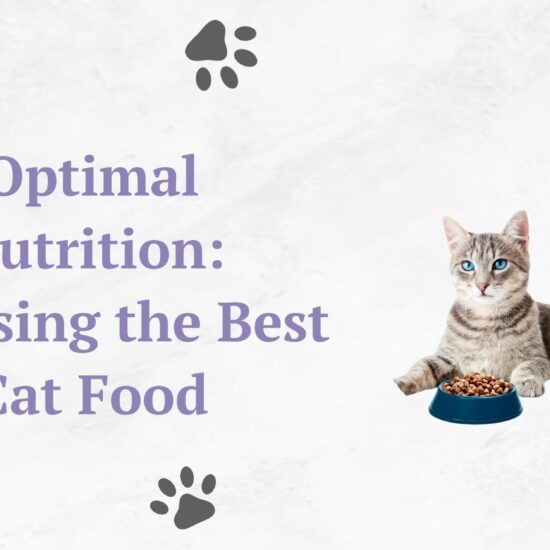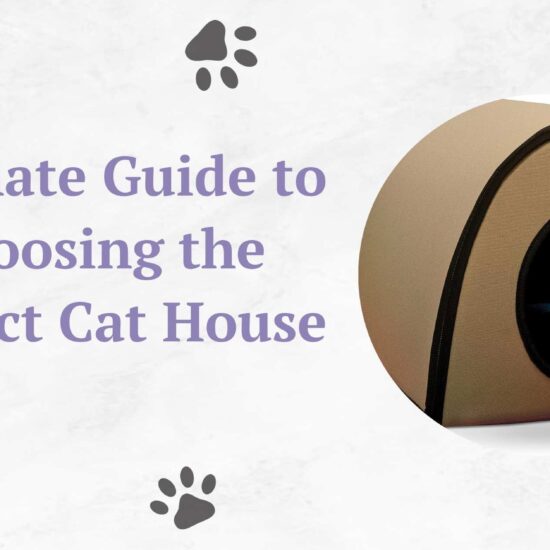Did you know probiotics are key to your dog’s health? They have a 4.7 out of 5-star rating from 171 reviews. These microbes help break down food, make nutrients, and fight off bad bacteria.
Probiotics are a natural way to keep your dog’s gut healthy. They help with stress, medications, and aging. There are many canine digestive supplements and dog probiotic treats to choose from. This makes it easy to give your dog the beneficial bacteria they need.
Table of Contents
What are Probiotics for Dogs?
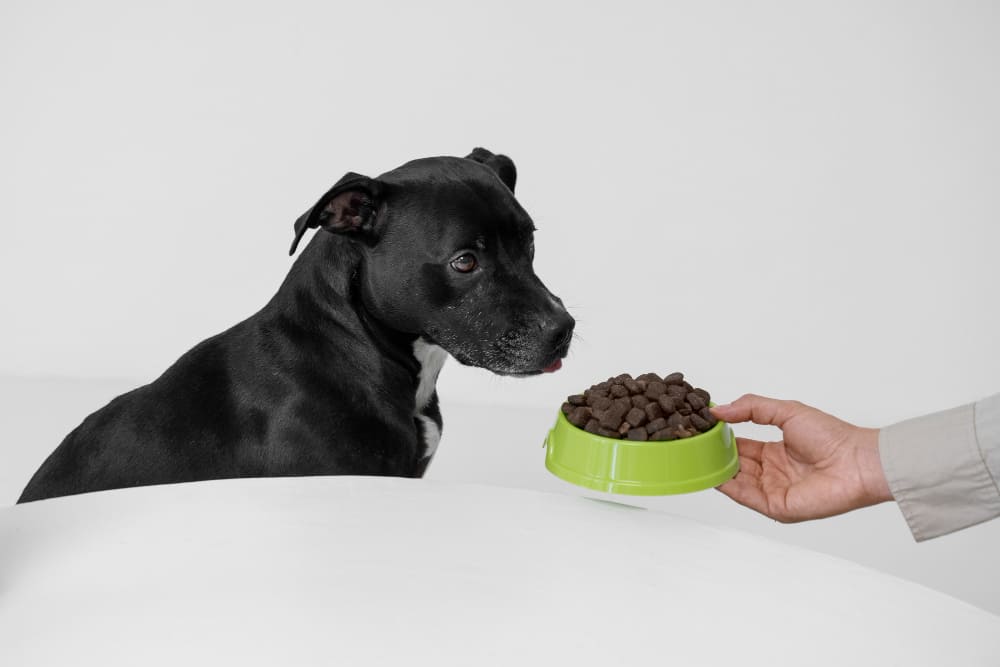
Probiotics are good bacteria and yeasts that live in a dog’s gut. They help with digestion, fight off bad bacteria, make important nutrients, and boost the immune system.
Beneficial Gut-Dwelling Microbes
Dogs have billions of probiotic bacteria in their guts. These microbes keep the gut healthy. Common probiotic strains in dogs include Lactobacillus acidophilus, Enterococcus faecium, Bifidobacterium lactis, Lactobacillus casei, and Bifidobacterium breve.
Types of Probiotics for Canine Consumption
Dogs can get probiotics in different ways:
- Yogurt or kefir with live cultures
- Probiotic powders or capsules
- Probiotic-infused dog treats or chews
- Commercially available dog foods with added probiotics
These supplements help with digestion, immune function, and overall health.
Benefits of Probiotics for Dogs
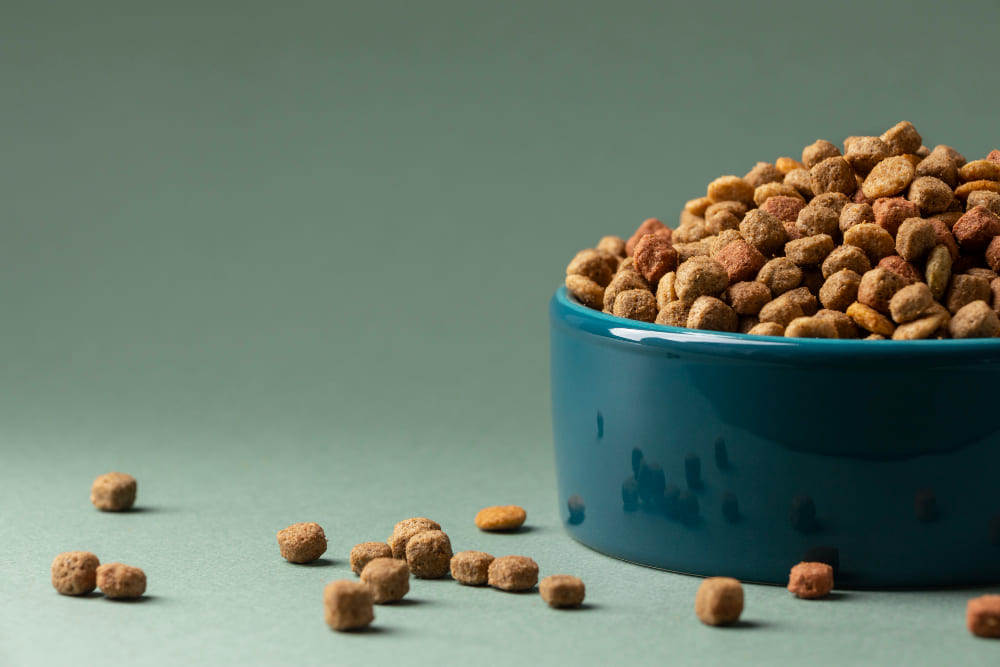
Probiotics are great for dogs’ health and happiness. They help balance the good bacteria in the gut. This improves digestion and boosts the immune system.
Digestive Health and Diarrhea Relief
Probiotics fix problems like diarrhea, gas, and bad breath. They balance the gut bacteria. This makes dogs feel better and stops diarrhea.
Research shows probiotics work well for dogs in shelters. They help with diarrhea and other stomach issues.
Immune System Boost
The gut is where most of a dog’s immune system is. Probiotics make the gut healthy. This helps the immune system work better.
This means dogs can fight off sicknesses better. They stay healthier and feel better overall.
| Benefit | Description |
|---|---|
| Digestive Health and Diarrhea Relief | Probiotics restore the balance of healthy gut bacteria, relieving issues like diarrhea, gas, and bad breath. |
| Immune System Boost | 70% of a dog’s immune system is located in the gut, so probiotics support overall immune function. |
Probiotics help dogs in many ways. They improve digestion, reduce diarrhea, and strengthen the immune system. This keeps dogs healthy and happy.
When to Use Probiotics for Dogs
Probiotics are great for dogs, especially when they’re stressed or their diet changes. They also help when dogs take antibiotics. These good microbes keep the gut healthy, which is important.
Stress and Diet Changes
Dogs get stressed for many reasons, like boarding or moving. This stress can upset their gut health, causing diarrhea. Also, sudden diet changes or bad food can mess with their gut balance. Giving probiotics can fix these problems.
Antibiotic and Medication Usage
Antibiotics and long-term meds, like steroids, harm a dog’s gut. They kill off good bacteria needed for a healthy gut. To counteract this, giving probiotics during and after treatment is a good idea.
Knowing when to give probiotics helps keep dogs healthy. It’s a way to support their overall well-being.
Choosing the Right Probiotic for Your Dog
When picking the best probiotics for your dog, consider a few important things. First, look for products that list the specific probiotic strains. These can include Lactobacillus acidophilus, Bifidobacterium animalis, or Bacillus coagulans. Each strain has its own effects, so it’s key to choose the right ones for your dog.
Strain Identification and Potency
The product should also show a guaranteed analysis of live, active bacteria. Experts say dogs need 1-10 billion colony forming units (CFUs) daily for good gut health. Make sure the product you choose meets this standard.
Expiration Dates and Shelf Life
Probiotics are living organisms that need care. Always check the expiration or use-by date on the package. Opt for a probiotic with a longer shelf life to keep the bacteria alive. Storing it in the fridge can also help keep it potent.
By focusing on the specific strains, potency, and expiration dates, you can pick the best probiotics for your dog. This ensures they get the most benefits from these supplements.
Probiotic Administration and Dosage
Adding probiotics to your dog’s daily routine is easy and helps their gut health. Most dogs like taking probiotics with their food. If your dog is finicky, you can hide probiotic capsules or powders in yummy treats.
The right amount of probiotics for dogs is between 1 to 10 billion CFUs a day. This range helps fit your dog’s specific needs and health. Dogs under 50 lbs need 1-3 billion CFUs, while bigger dogs might do well with 2-5 billion CFUs.
Probiotics can be given before stressful events like boarding or moving. It’s best to start a few days early. They can also be part of your dog’s regular care to keep their digestive and immune systems healthy.
| Dog Weight | Probiotic Dosage (CFUs per day) |
|---|---|
| Under 50 lbs | 1-3 Billion |
| Over 50 lbs | 2-5 Billion |
Remember, too much probiotics, especially with many strains, might not help your dog. The goal is to find the perfect amount that suits your dog’s needs.
Probiotics for Dogs: Boost Your Pet’s Gut Health
Probiotics are great for keeping dogs healthy. They help fix gut problems and boost overall health. Adding probiotics to your dog’s food can improve digestion and fight off bad bacteria.
Studies show probiotics are good for dogs. Nutramax Proviable-DC Digestive Health Supplement has 5 billion CFUs and seven strains of bacteria. Vet’s Best Probiotic Soft Chews have about 1.5 billion CFUs per chew. Vital Planet Flora Dog Probiotic has 20 billion CFUs and 10 strains of bacteria.
Probiotics are key for a dog’s health. They help boost your pet’s gut health and aid in digestion and diarrhea relief. They also support the immune system. Adding quality probiotics to your dog’s diet can keep them healthy and full of energy.
“Probiotics are a nutritional tool to consider for the health of your dog. When a dog’s gut balance is disrupted, it can lead to a variety of issues, including digestive problems and a decline in overall health.”
Probiotics are vital for dogs facing stress, diet changes, or antibiotics. The right probiotics can keep their gut healthy. This ensures your dog lives a long, happy life.
Probiotic Strains Beneficial for Dogs
Keeping your dog’s gut healthy is key. Certain probiotics are especially good for them. Lactobacillus acidophilus and Bifidobacterium animalis are two that have been well-studied.
Lactobacillus acidophilus for Canines
Lactobacillus acidophilus is a probiotic that helps with dog poop. It can make stool quality and frequency better. It also helps with diarrhea and supports a healthy gut.
Bifidobacterium animalis for Dogs
Bifidobacterium animalis, especially the AHC7 strain, is good for dogs too. It helps with acute diarrhea, a big problem for dogs. It stops bad bacteria and helps good microbes grow, keeping the gut healthy.
Other probiotics like Lactobacillus casei, Lactobacillus plantarum, and Bifidobacterium longum are also being looked at. As research goes on, more probiotics might be available to help dogs stay healthy.
Prebiotics: The Fuel for Probiotics
Prebiotics are key to your dog’s gut health. They feed the good bacteria in your dog’s gut. This helps the good microbes grow and multiply, making your dog’s gut even healthier.
Using both prebiotics and probiotics can boost your dog’s health. Probiotics help replace good bacteria lost due to antibiotics or illness. Prebiotics strengthen your dog’s immune system by supporting these beneficial bacteria.
Natural prebiotics for dogs include chicory root, dandelion greens, bananas, apples, broccoli, blueberries, asparagus, oats, Jerusalem artichokes, and flaxseeds. Adding these foods to your dog’s diet can help their gut health naturally.
Oats have beta-glucan soluble fiber, which acts as a prebiotic. It helps with digestion and lowers cholesterol. Jerusalem artichokes have inulin, a prebiotic that feeds the gut bacteria, aiding digestion.
Combining prebiotics and probiotics, or synbiotics, offers the best gut health support for your dog. Since 70% of the body’s immune system is in the gut, keeping it healthy is vital for your dog’s well-being.
Potential Side Effects and Precautions
When it comes to side effects of probiotics for dogs, pet owners can rest assured. They are generally safe and well-tolerated. Studies show that probiotics don’t promote antibiotic resistance in other bacteria. They are not harmful themselves.
However, it’s important to note that severely immunocompromised dogs should only be given probiotics with caution. They should be under veterinary supervision. Their weakened immune systems may not handle the bacterial load well.
During the initial transitional phase of introducing probiotics, some dogs may experience mild side effects. These can include excess gas, bloating, and increased thirst. These changes are usually temporary and should subside within a few days or a couple of weeks.
It’s crucial to know the unique characteristics and functions of different probiotic species. This ensures the right selection for a particular dog. For instance, some species like E. faecium may be more controversial due to their potential pathogenicity.
Overall, probiotics are considered very safe for dogs, with few reported side effects. Anecdotal evidence suggests they can be beneficial. They support the gastrointestinal tract, boost the immune system, and compete with harmful microbes. Always consult with a veterinarian before starting a probiotic regimen for your canine companion.
Cost and Accessibility of Dog Probiotics
Pet owners have many options when it comes to dog probiotics. These supplements come in different forms like capsules, chews, and powders. Prices vary based on the brand, potency, and how much you get.
For example, Tails ‘N’ Tummies is a top choice. It offers 1 billion CFUs per tablet and has a 60-day refund policy. On the other hand, Proviotic has 5 billion CFUs per capsule. Pawfy provides 2.5 billion CFUs per chew with a 30-day refund policy.
| Probiotic Brand | CFUs per Serving | Price Range | Refund Policy |
|---|---|---|---|
| Tails ‘N’ Tummies | 1 billion | check price | 60 days |
| Proviable | 5 billion | check price | N/A |
| Pawfy | 2.5 billion | check price | 30 days |
| Purina Fortiflora | 100 million | check price | 60 days |
Dog probiotics are easy to find. You can get them at pet stores, vet clinics, and online. This makes it simple for pet owners to help their dogs stay healthy.
Note: There might be affiliate links mentioned here. We may receive a commission if you purchase a product through an affiliate link. There is no additional charge for you. Please do your own research before making any online purchases.
Probiotic Dog Food and Treats
Probiotics are great for dogs too. Now, pet owners can find probiotic dog foods and treats. These help keep their furry friends’ guts healthy and happy.
There are many probiotic dog foods to choose from. Purina Pro Plan Complete Essentials is the top pick. It’s packed with 32% protein and good for all dogs.
Taste of the Wild High Prairie Dry Dog Food is a splurge option. It’s also great for both adults and puppies. For small dogs, Solid Gold Mighty Mini Small Breed Dog Food is the best. It has kibble for small mouths and 90 million probiotics per pound.
For treats, Zesty Paws Probiotic Bites are the best for picky dogs. They come in many flavors and are grain-free. PetLabCo’s Probiotic Chews are also great. They have added enzymes, antioxidants, and eight strains of good bacteria in a tasty pork flavor.
| Product | Category | Key Features |
|---|---|---|
| Purina Pro Plan Complete Essentials | Best overall probiotic dog food | Contains live probiotics for digestive and immune support |
| Taste of the Wild High Prairie Dry Dog Food | Best splurge probiotic dog food | 32% protein, suitable for adults and puppies |
| Solid Gold Mighty Mini Small Breed Dog Food | Best probiotic food for small dogs | Kibble sized for small mouths, 90 million probiotics per pound |
| Zesty Paws Probiotic Bites | Best probiotic bites for picky dogs | Grain-free formula with six-strain probiotic blend |
| PetLabCo’s Probiotic Chews | Best probiotic bites for digestion | Added enzymes, antioxidants, eight strains of beneficial bacteria |
Pet owners can also add natural probiotics to their dog’s diet. Greek yogurt, fermented vegetables, and raw green tripe are good options. They help keep their dog’s gut healthy and happy.
Purina Pro Plan Complete Essentials
Solid Gold Mighty Mini Small Breed Dog Food
Zesty Paws Probiotic Bites
DIY Probiotic Recipes for Dogs
Pet owners are now more aware of the need for gut health in dogs. They are making natural probiotics for canines at home. This is a cost-effective and customizable way to help their dog’s digestive and immune system.
One easy recipe mixes plain yogurt, peanut butter, and pumpkin puree. Then, freeze it into treats. Another recipe uses kefir, goat’s milk, Greek yogurt, cranberries, parsley, and fish oil. These can be frozen into cubes.
A probiotic-rich berry mix is made with a probiotic culture starter, honey, and a pinch of salt. You can also make frozen treats with plain yogurt, chopped parsley, and shredded carrots. For a more complex recipe, blend coconut milk, natural peanut butter, chopped carrots, maple syrup, and probiotic capsules.
Remember, these DIY dog probiotics should be made in small batches. Store them in the fridge or freezer for up to a week or ten days. Heat can kill the live cultures. Keep them in clean, airtight containers to preserve the bacteria.
Adding these homemade probiotic recipes for dogs to your pet’s diet can offer many health benefits. It can improve digestion, nutrient absorption, and boost the immune system. By using natural probiotics, you can help your dog stay healthy and happy.
Probiotics for Specific Canine Conditions
Allergies and Skin Disorders
Probiotics might help dogs with allergies and skin problems. They help the digestive system work right, which is key for a healthy immune system. This is important for dogs with allergies and skin disorders.
Some studies show that probiotics like Bifidobacterium longum (BL999) can lessen inflammation. They can also calm irritated skin.
Anxiety and Stress
Probiotics could also help dogs with anxiety and stress. Bifidobacterium longum (BL999) has been shown to reduce anxiety in dogs. This includes behaviors like barking, jumping, and pacing.
By keeping the gut microbiome balanced, probiotics can make anxious dogs feel calmer. This is great for dogs that get stressed or anxious easily.
Even though probiotics seem promising, more research is needed. Always talk to a vet before giving your dog probiotic supplements.
Probiotics for Overall Canine Wellness
Probiotics are key for our dogs’ health. They keep the gut bacteria in balance. This helps with digestion, immune function, and overall health. The Ultimate Probiotic 9 Strains has 9 good strains, including Lactobacillus and Bifidobacterium, with at least 5 billion CFU per serving.
A healthy gut is vital for a dog’s health. It prevents and treats many issues, like diarrhea and skin problems. Probiotics help keep the good bacteria in the lead. This boosts the immune system, as a healthy gut is linked to strong immunity.
Adding quality probiotics, like the Ultimate Probiotic 9 Strains, is good for dogs. It supports the balance of gut bacteria. This improves their overall health and life quality.
Disclaimer: The information provided in this article is for educational purposes only and should not be considered as a substitute for medical advice. Consult a registered Veterinary practitioner before using or trying any product suggested here in this article.
FAQ
What are probiotics for dogs?
Probiotics for dogs are good bacteria and yeasts in their gut. They help digest food, fight off bad bacteria, and boost the immune system.
What types of probiotics can dogs consume?
Dogs can eat probiotics in yogurt, kefir, powders, capsules, chews, and dog food. These products have bacteria like Lactobacillus acidophilus and Bifidobacterium lactis.
What are the benefits of probiotics for dogs?
Probiotics help dogs with digestion and diarrhea. They also strengthen the immune system. They keep the gut bacteria balanced, which can be upset by stress or diet changes.
When should I give my dog probiotics?
Give probiotics to healthy dogs prone to diarrhea in stressful situations. Puppies with diarrhea after vet visits or training can also benefit. Use them before stressful events like boarding.
How do I choose the right probiotic for my dog?
Look for specific probiotics on the label, like Lactobacillus acidophilus. Make sure the product guarantees live bacteria at the end of its shelf life.
How much probiotic should I give my dog?
Dogs need 1-10 billion CFUs of probiotics daily. You can give them before stressful events or every day for their health.
What probiotic strains are beneficial for dogs?
Lactobacillus acidophilus improves stool quality. Bifidobacterium animalis (strain AHC7) helps with diarrhea. Bifidobacterium longum (BL999) can reduce dog anxiety.
What are prebiotics, and how do they work with probiotics?
Prebiotics feed the good bacteria in the gut. They help probiotics grow and multiply, supporting gut health.
Are there any potential side effects or precautions with probiotics for dogs?
Probiotics are usually safe for dogs. But dogs with weak immune systems should use them carefully. Always check with a vet first.
Can probiotics help with specific canine conditions?
Yes, probiotics can help dogs with allergies, skin issues, anxiety, and stress. Bifidobacterium longum (BL999) can reduce anxiety in dogs.


